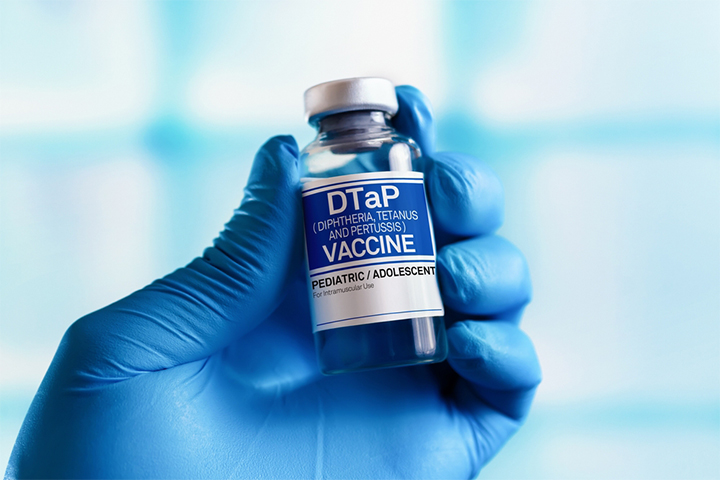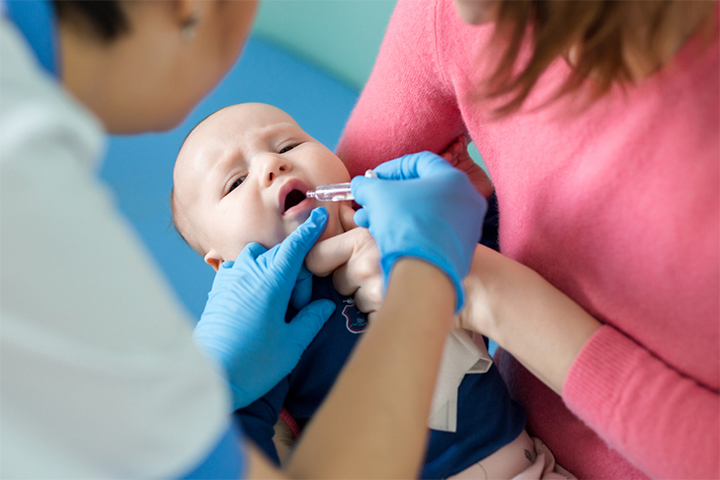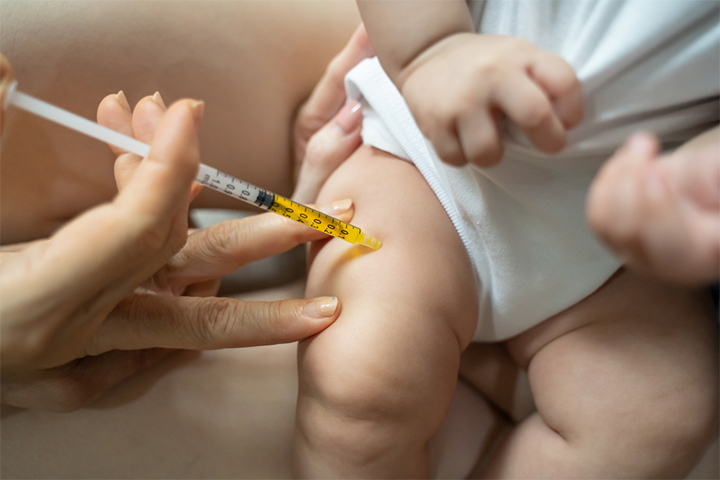Most babies receive their second dose of vaccines during their 4-month vaccinations. These vaccines help prevent diseases and offer long-term protection against several serious diseases. Doctors may also advise additional vaccinations such as meningococcal vaccines in some cases for high-risk infants.
Although most babies receive their first dose by the second month, the second dose of vaccines is recommended to boost their immune system. Therefore, as per recommendations of the US Centers for Disease Control and Prevention (CDC) and the American Academy of Pediatrics, all newborns should be given scheduled vaccinations.
Read this post to learn more about the vaccinations administered to infants at four months.
Which Immunization Shots Do Four-Month-Olds Get?
According to the Advisory Committee on Immunization Practices (ACIP) and approved by the US Centers for Disease Control and Prevention (CDC), American Academy of Pediatrics (AAP), and American Academy of Family Physicians (AAFP), a second dose of the following vaccines are included in the immunization schedule of a four-month-old baby (1).
1. DTaP vaccine
DTaP vaccine is given to prevent diphtheria, tetanus, and pertussis (whooping cough) in babies. This is the newer version of the DTP vaccine with fewer side effects and more safety. DTaP vaccine contains acellular pertussis antigen (parts of pertussis bacteria) with tetanus and diphtheria toxoids (a modified toxin that is no longer toxic). The older DTP vaccines contained whole-cell pertussis and often caused severe immune reactions, and the vaccine is no longer recommended in many countries.
Toxins of Corynebacterium diphtheriae cause diphtheria. These bacteria can spread through air or direct contact and cause symptoms such as sore throat, mild fever, swollen lymph nodes in the neck, and weakness. Diphtheria may result in heart failure, coma, paralysis, or death in babies.
Clostridium tetani bacteria cause tetanus. These bacteria can enter the body through skin cuts, and their toxins cause painful muscle spasms. Stiffness in abdominal and neck muscles, swallowing problems, and fever are common symptoms of tetanus. Muscle spasms can lead to severe breathing trouble, broken bones, and death in babies.
Pertussis or whooping cough is a highly contagious respiratory disease spread from air and direct contact. A runny nose and severe cough with a pause in breathing (apnea) are the signs of pertussis infection. This may lead to severe pneumonia and death in babies. It is recommended that everyone who will be in close contact with newborns be up to date with their whooping cough vaccination.
2. Hib vaccine
Hib vaccine prevents Haemophilus influenzae type b disease in infants. Hib bacteria can spread through air or direct contact and do not cause symptoms unless they enter the bloodstream. This may cause meningitisiXAn inflammation of the fluid and membranes surrounding the brain and spinal cord., pneumoniaiXAn bacterial or viral infection characterized by inflammation of the air sacs in the lungs., epiglottis, and death in babies.
Hib infection may also contribute to intellectual disability in the future. In many cases, epiglottitisiXA condition in which the tissue covering the windpipe becomes inflamed. may result in life-threatening complications such as windpipe obstruction and severe breathing troubles.
3. IPV vaccine
IPV or inactivated polio vaccine prevents polio or poliomyelitis in babies. Polio can spread from an infected person to others through the air, direct contact, or through the mouth (fecal-oral route). The infection may often go unnoticed since many can be asymptomatic or may have a fever and sore throat. Polio may cause permanent paralysis and death in unvaccinated people.
Hence, vaccination against polio is vital. According to the WHO, using the inactivated polio vaccine (IPV) has resulted in a remarkable decline of over 99% in wild poliovirus cases since 1988, and only six cases were reported globally in 2021.
4. RV vaccine
RV or rotavirus vaccine prevents rotavirus diseases. Rotavirus is spread from the mouth (fecal-oral route) and often causes diarrhea, vomiting, and fever. Severe diarrhea and dehydration can be life-threatening to infants and young children. The rotavirus vaccine is given orally and not through injection.
5. PCV13 vaccine
PCV13 or pneumococcal conjugate vaccine protects against pneumococcal disease caused by 13 types of pneumococcal bacteria. These bacteria can spread from air or direct contact and can cause mild to severe illnesses like pneumonia (lung infection) in babies. Complications of pneumococcal diseases, such as meningitis and blood infection (bacteremia), can be life-threatening in infants.
Combination vaccines that contain more than one vaccine in a single shot are available in most countries. This reduces the number of shots and reactions in many babies. Common combination vaccines for the fourth month may include Kinrix with DTaP and IPV combination and Pentacel with DTaP, IPV, and Hib combinations. You may speak to your baby’s pediatrician to learn about the various combination vaccines available in your country or region.
Who Gets The Meningococcal Vaccine At Four Months Of Age?
The second dose of the meningococcal vaccine is given at four months to babies noted to fulfill the following special conditions (2).
- Functional or anatomic aspleniaiXPhysical absence of a spleen, primarily because of its surgical removal. such as sickle cell anemiaiXAn inherited condition in which red blood cells become hard, sticky, and sickle-shaped.
- Use of complement inhibitor medications, such as bevacizumab or eculizumab
- Persistent complement component deficiency
Meningococcal vaccines prevent meningococcal disease caused by Neisseia meningitidis bacteria. Babies may get MenB vaccines or serogroup B meningococcal vaccines, such as Bexsero and Trumenba.
Why Are Second Doses Of Some Vaccines Needed?
The number of doses of the particular vaccine depends on the following factors (3) (4).
- Type of vaccine: Vaccines made from weakened viruses known as live attenuated vaccines provide immunity by reproducing at low levels in the body. Therefore, attenuated vaccines can create strong immune responses in fewer doses. In comparison, vaccines made from toxoids (inactive bacterial toxins) or some proteins may require more amounts to develop adequate immunity.
- Immune system response: Some vaccines, such as inactivated vaccines, may not give as much immunity with the first dose, and second or more doses are required to build complete immunity. For example, a single dose of the Hib vaccine does not completely protect the baby. In addition, immune responses may fade or weaken over time in some vaccines. In such cases, a booster dose of vaccine is needed to ensure maximum immunity or protection against the disease.
- Disease burden in the community: The amount of viral or bacterial diseases spreading in a community is directly related to how many people are susceptible (likely to get the disease). Usually, when all people are vaccinated, the amount of disease spreading in the community is less. So, an additional dose of vaccine is required to maintain immunity since the illness may appear less frequently. Thus, sometimes, additional booster doses of vaccine may be given during the outbreak to enhance immunity.
Partial vaccination does not provide complete immunity. Therefore, experts recommend giving all doses and booster doses of vaccines as per schedule to protect your baby from vaccine-preventable diseases.
What Are The Common Immune Reactions Of Four-Month Shots?
Immune reactions mean that the vaccines are working and the body is producing antibodies against the disease. Vaccines can cause temporary injection site reactions such as swelling, pain, and redness and general reactions such as fussiness and fever in most babies.
Most four-month vaccines do not cause any severe side effects or reactions in babies. Local (shot site) immunization reactions of most four-month vaccines start within 24 hours of the shot and often last up to three to five days. DTaP vaccine may cause local reactions up to seven days in some babies. Vaccine-related fever may last up to one or two days in most cases.
In rare cases, babies may experience severe reactions, such as rotavirus vaccine may cause intussusceptioniXA type of bowel obstruction where one part of the intestine slides inside the other. in some cases (5). Some babies may develop severe allergic reactions called anaphylaxisiXAn extreme reaction to an allergen causing breathing difficulties and loss of consciousness. within 20 minutes or up to two hours after the vaccination. Therefore, parents are advised to wait for 30 minutes after vaccinations since vaccine administrators are trained to handle such situations and treat anaphylaxis immediately.
When To See A Pediatrician?
You may contact the pediatrician if you think that your baby requires emergency help for immune reactions. Seek help from a pediatrician if your baby has any of the following problems after immunization (5).
- Breathing trouble
- Swallowing problems
- Weakness
- Not moving or responding
- Unable to wake up
- Persistent crying lasting several hours
- High-pitched crying for more than an hour
- Severe crying and vomiting after rotavirus vaccine
- Fever over 40°C (104°F)
- Increase in redness and swelling at the injection site
It is not recommended to give fever medications to babies before being examined. You may seek pediatric help to manage fever in babies.
Are There Any Reasons Not To Get Four-Month Shots?
Vaccines are not administered if any contraindications are present. Contraindications are health conditions in the baby that increase the chance of severe adverse reactions to a vaccine. Four-month vaccines and other vaccines are not given if any of the following permanent contraindications are present (6).
- Anaphylaxis or a severe allergic reaction to a vaccine component. All vaccines containing the same component and the subsequent doses of the same vaccine are not given to babies with known anaphylaxis.
- History of intussusception is contraindication to administer rotavirus vaccine.
- EncephalopathyiXAny disease that alters brain function or structure, leading to impaired memory and confusion. occurring within seven days of pertussis vaccine with no other identifiable cause is a contraindication to give a subsequent dose of pertussis-containing vaccine.
- SCID (severe combined immunodeficiency)iXA rare genetic disorder caused by gene mutations that result in life-threatening problems with the immune system. is a contraindication to give a rotavirus vaccine.
These four conditions are the only permanent contraindications to vaccination. Immunosuppression is a temporary contraindication to immunization with live vaccines.
Four-month vaccines can be deferred or delayed for some babies due to precautions. These are health conditions that may increase the chance of an adverse reaction, cause diagnostic confusion, or compromise the ability of vaccines to produce a desired immune response. If precautions are present, pediatricians may decide whether to vaccinate or not based on the risks and benefits of the vaccine.
Permanent precautions to four-month vaccines may include (6):
- Spina bifida, altered immunocompetence other than SCID, bladder exstrophy (birth defect with bladder developed outside), and chronic gastrointestinal diseases are precautions to administer rotavirus vaccine.
- Guillain-Barré syndrome (GBS) happening six weeks or less after a previous tetanus immunization or other tetanus toxoid-containing vaccines.
Temporary precautions to four-month vaccines and other vaccines may include (6):
- Severe or moderate acute illness.
- Progressive neurologic disorders such as uncontrolled epilepsy, infantile spasms, and progressive encephalopathy.
- Arthus-type hypersensitivity reaction to two-month (or previous dose) of diphtheria toxoid or tetanus toxoid vaccine.
The risk-benefit decision is taken if vaccine safety precautions are present. For example, family history of adverse reactions unrelated to SIDS (sudden infant death syndrome), immunosuppression, or seizures is not a contraindication for four-month vaccines.
The following conditions are often misinterpreted as contraindications or precautions (invalid contraindications or precautions to vaccination) to four-month and other childhood vaccines (6).
- Mild illness such as low-grade fever, mild diarrhea, cold, other upper respiratory tract infections, or otitis media (ear infection).
- Allergies to the products in vaccines that are not anaphylactic.
- Allergies to products not present in the vaccine.
- Antimicrobial therapy does not influence the immune response to vaccines. Antivirals may need precaution in some vaccines, but they do not interfere with four-month vaccines.
- Household contact with immunosuppressed persons, pregnant, or breastfeeding mothers.
- Preterm birth is not a contraindication to vaccination. Preemies are vaccinated based on their chronological age.
- The use of aerosolized steroids for asthma is not a contraindication to vaccines.
You may talk to the pediatrician to know when your baby can get the delayed dose of four-month vaccines if any of them are postponed due to temporary contraindications or precautions.
What Else Should You Expect At A Four-Month Infant Appointment?
The pediatrician may weigh your baby and measure their length during the four-month checkup to ensure their growth. They may also look for other age-appropriate developments and reflexes in your baby. Doctors may evaluate and ask a few questions to understand the baby’s development. The following signs of development are usually assessed during the four-month infant visit.
- Making sounds and laughing
- Responding to caregivers or parents voices
- Smiling
- Trying to grab things
- Making eye contact
- Sucking hands or fingers
- Copying facial expressions
- Holding up head
- Trying to roll over
- Turning head towards parent or caregiver
- Pushing up while lying on their tummy
- Feeding and diaper change frequency
These factors may help the doctor understand whether your baby is reaching their four-month milestones or not. They may also ask about your travel plans and childcare centers to suggest the best ways to keep your little one healthy.
Your baby will need several pediatric vaccinations once they attain the age of four months. The 4-month vaccinations often include the second doses to strengthen your baby’s immune function. While your infant may experience a typical vaccination reaction, you should call your pediatrician immediately if your child experiences breathing difficulties, a high temperature, swelling at the injection site, or other symptoms after immunization. Vaccination provides long-term protection to a baby, so have your baby vaccinated as per the vaccine schedule. If your four-month-old infant has specific health concerns, such as anaphylaxis, SCID, spina bifida, or GBS, necessary childhood immunization precautions should be followed.
Key Pointers
- A four-month-old baby gets the second dose of DTaP, Hib, and IPV vaccines, among others.
- The common immune reaction after the vaccination may be pain, swelling, redness, and fever.
- Consult a doctor if babies experience severe issues such as breathing trouble, weakness, high-pitched crying, vomiting, etc.
- Vaccines may be avoided if conditions like anaphylaxis, encephalopathy, etc., are present.















